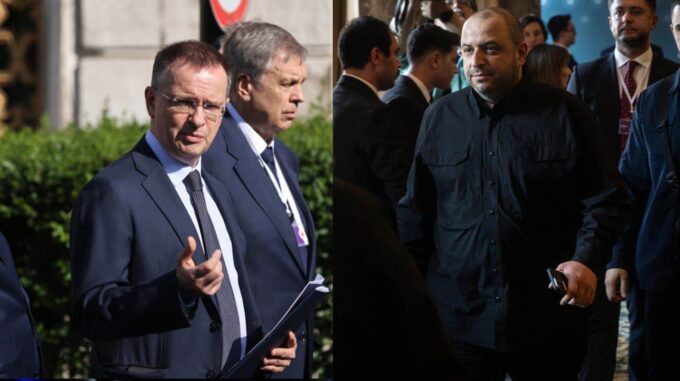Russian propaganda is once again attempting to create chaos around Ukrainian-Russian negotiations by spreading fake messages and manipulations to discredit the Ukrainian delegation in Istanbul

The Center for Countering Disinformation (CCD) officially refuted the widespread false information disseminated by Russian media about an alleged personal meeting between Ukraine’s Defense Minister Rustem Umerov and the head of the Russian delegation, Vladimir Medinsky. According to analysts, this false statement aims to undermine trust in Ukrainian negotiators and create the impression that Ukraine is delaying peace talks, while Russia systematically avoids concrete agreements on a ceasefire. As reported by the CCD on its Telegram channel, the real situation is different. According to their data, a meeting between Russian and Ukrainian delegations did indeed take place in the presence of Turkish Foreign Minister Hakan Fidan, who acted as an intermediary in this process. However, the claims about supposedly “closed agreements” or “secret deals” allegedly reached during these negotiations are unfounded manipulations aimed at increasing political pressure and damaging trust in the Ukrainian side. The Center emphasizes that all official agreements were documented and transparently discussed. Furthermore, the CCD stressed that Russia is preparing a broad information campaign directed at two vectors simultaneously. On one hand, the internal information space in Ukraine could be filled with fakes and conspiracy theories about supposed personal connections between Ukrainian representatives and Russian authorities. The goal of such disinformation is to sow doubt about the Ukrainian delegation and reduce its authority within the domestic information space. At the same time, Russian media and propagandist resources spread messages claiming that Ukraine is the one delaying peace negotiations and intentionally complicating compromises. At the same time, the CCD highlights that it is actually Moscow that systematically shirks its obligations to cease fire and undermines the diplomatic process. Russian propaganda seeks to shift the agenda by promoting a scenario in which Russia portrays itself as a peacemaker, while accusing Ukraine of stalling negotiations. The goal is to create the illusion that Ukraine is sabotaging the peace process, which is outright false and an attempt to justify its own military actions. These statements respond to a widely circulated Russian media report from TASS, claiming that the Ukrainian delegation and Russian representatives held a personal bilateral meeting before the start of negotiations in Istanbul. According to Russian sources, this meeting supposedly lasted over an hour and was a second step aimed at facilitating further dialogue. However, the Ukrainian side officially denies this information, emphasizing that no such meetings or agreements took place, and that all diplomatic work is conducted according to established protocols with open negotiations. It should be noted that prior to this, several rounds of negotiations between Ukrainian and Russian delegations took place in Istanbul. A previous meeting of Ukrainian and Russian representatives lasted over an hour and was the second in a series starting from May 16. Before that, key Ukrainian delegates — First Deputy Minister of Foreign Affairs Serhii Kyslytsia and Oleksandr Bevz — held consultations with other European partners of Ukraine, including Germany, Italy, and the United Kingdom, to align positions and prepare for subsequent negotiation rounds. After several rounds in Istanbul, Ukrainian and Russian delegations agreed on an important next step — an exchange of all wounded and young servicemen, which is intended to improve the situation at the front and create conditions for further diplomatic efforts. However, Russian media and information agencies published a “Russian memorandum” on the evening of June 2, proposing ceasefire ideas that include granting Ukraine special status, holding elections in certain regions, and withdrawing troops from four oblasts. These documents were supported by concepts of Ukraine’s neutral status and phased withdrawal of troops, raising doubts about Russia’s real intentions. Diplomatic processes are expected to continue, and their future depends on our joint efforts and ability to counteract disinformation, which is actively spreading with the aim of destabilizing internal and international stability.

